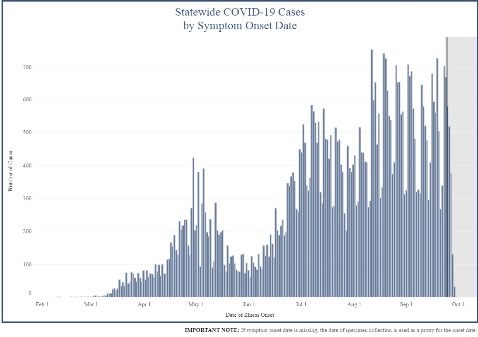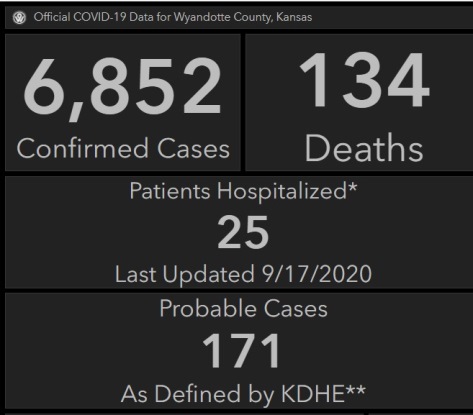

Gov. Laura Kelly today announced a unified statewide COVID-19 testing program for Kansas.
While the state has had COVID-19 testing for some time, it now will be coordinated, Gov. Kelly sid n a news conference Monday afternoon.
The state will use all platforms to increase testing rapidly, she said. Public and private testing will be coordinated, and testing is being expanded to include those who do not have symptoms as well as those who have symptoms and have been in close contact with CVOID-19 patients, she said.
Gov. Kelly reported 2,037 additional positive COVID-19 cases since Friday morning, and five additional deaths statewide. It was the largest increase since reporting began, according to the governor. There is a total of 58,629 COVID-19 infections, 2,852 hospitalizations and 637 deaths in the state, she said.
The governor also talked about routine tests of at-risk congregate settings such as nursing homes, schools and correctional facilities. Front-line workers also may be tested more. Also included will be places where contact tracing has proven difficult, she added.
The tests, masks and social distancing will better contain the virus, she said, and allow the state to reopen responsibly.
Kansas put about $52 million toward testing in the third round of CARES Act funding, she said. Also, about 150 million rapid coronavirus tests are being sent to the states from the federal government.
Currently, Kansas is testing about 60,000 people a week and needs to increase it, she said.
Gov. Kelly said Kansas needs to keep a healthy work force and get its COVID-19 rates down in order to attract and keep economic development projects.
Dr. Marci Nielsen, vice president of testing and strategy at GEHA, will coordinate the new testing program, Gov. Kelly said.
Dr. Nielsen, who holds a doctor of philosophy in health policy and management from Johns Hopkins School of Public Health and a master’s in public health from George Washington University School of Medicine, is the co-founder of the CVKey Project, which recently developed mobile applications for screening.
In the past, she was CEO and president of the Patient-Centered Primary Care Collaborative; vice chancellor for public affairs of the University of Kansas Medical Center; assistant and associate professor at KU Medical Center; and executive director of the Kansas Health Policy Authority.
Wyandotte County reported an additional 27 COVID-19 cases on Monday afternoon, for a cumulative total of 6,852, according to the Unified Government COVID-19 webpage. There were no additional deaths, for a cumulative total of 134. Wyandotte County recently reported 14.4 percent in the 7-day rolling average of positive test percentages, according to the UG COVID-19 resource hub.
The University of Kansas Health System reported 33 acute COVID-19 patients hospitalized on Monday morning, an increase from 23 on Friday, according to Dr. Dana Hawkinson, medical director of infection prevention and control. There were 10 patients in the intensive care unit, an increase from six on Friday, and three on ventilators, the same as Friday. KU Health System has 19 other COVID-19 patients still hospitalized, but who are no longer considered acutely infectious, a decrease from 22 on Friday. HaysMed reported 18 COVID-19 inpatients, an increase from 17 on Friday.
According to Dr. Hawkinson, the 7-day average of cases is down in the Kansas City metropolitan area, but that number is expected to increase in the coming weeks.
At the KU Health System doctors’ news conference on Monday morning, Dr. Marc Parrish said studies have shown that there was an average of 10 percent of all births in the United States that were pre-term, not that different from 12 percent pre-term births for those who are pregnant and have COVID-19.
KU Health System had 72 mothers total who tested positive for COVID-19 and did very well with their pregnancy and deliveries, according to Dr. Parrish. He advised those who are pregnant to wear a mask, socially distant and practice good hygiene. In addition, Dr. Parrish advised pregnant women to get a flu shot.
Free testing continues Tuesday
Free COVID-19 testing will be available from 8 a.m. to 11 a.m. Tuesday, Sept. 29, at All Saints Parish, 811 Vermont Ave., Kansas City, Kansas.
The pop-up tests are through the Health Equity Task Force and Vibrant Health.
Free tests also are at the UG Health Department parking lot, 619 Ann Ave., Kansas City, Kansas. They are open from 9 a.m. to 3 p.m. Monday through Friday. No appointment is needed.
The tests are for those who live or work in Wyandotte County. Participants should bring something that shows their address or their work place, such as a piece of mail or a work badge.
The pop-up tests and the Health Department tests now are open to asymptomatic people as well as those who have symptoms or have been exposed to COVID-19. Check with the UG Health Department’s Facebook page to see if there have been any changes in the schedule because of the weather or for other reasons.
More information about testing is at https://wyandotte-county-covid-19-hub-unifiedgov.hub.arcgis.com/pages/what-to-do-if-you-think-you-have-covid-19, or call 311.
The Health Department has released its testing schedule for October, and it is online at https://wyandotte-county-covid-19-hub-unifiedgov.hub.arcgis.com/pages/what-to-do-if-you-think-you-have-covid-19.
The governor’s news conference is at https://www.facebook.com/GovLauraKelly/videos/393383638728572.
To see the KU doctors’ news conference, visit https://www.facebook.com/GovLauraKelly/videos/393383638728572
The Health Department has released its testing schedule for October, and it is online at https://wyandotte-county-covid-19-hub-unifiedgov.hub.arcgis.com/pages/what-to-do-if-you-think-you-have-covid-19.
More information about testing is at https://wyandotte-county-covid-19-hub-unifiedgov.hub.arcgis.com/pages/what-to-do-if-you-think-you-have-covid-19, or call 311.
The KDHE’s COVID-19 webpage is at https://www.coronavirus.kdheks.gov/.
The UG COVID-19 webpage is at https://alpha.wycokck.org/Coronavirus-COVID-19-Information.
The Unified Government COVID-19 hub outbreak map at https://wyandotte-county-covid-19-hub-unifiedgov.hub.arcgis.com/.
To see an NEA list of schools that have had COVID-19 cases, visit https://app.smartsheet.com/b/publish?EQBCT=aa3f2ede7cb2415db943fdaf45866d2f.
The KC Region COVID-19 Hub dashboard is at https://marc2.org/covidhub/.
The Unified Government Health Department is collecting input on people’s experiences getting tested for COVID-19 in Wyandotte County. The survey is on the UG website at https://us.openforms.com/Form/ea97a450-3d74-4d86-8d1f-6e340d55cf7c.
The UG Health Department school and sports guidance is online at https://alpha.wycokck.org/files/assets/public/health/documents/covid/09042020fallsportsrecommendations.pdf.
A previous UG sports order is online at https://alpha.wycokck.org/files/assets/public/health/documents/covid/08132020localhealthofficerorderregardingsports.pdf.
The Wyandotte County school start order is online at https://alpha.wycokck.org/Coronavirus-COVID-19-Information.
Wyandotte County is under a mandatory mask order and is in Phase 3 of the state’s reopening plan. For more information, residents may visit the UG COVID-19 website at https://alpha.wycokck.org/Coronavirus-COVID-19-Information or call 311 for more information.
The CDC’s COVID-19 webpage is at https://www.cdc.gov/coronavirus/2019-nCoV/index.html.
